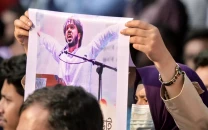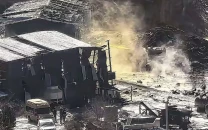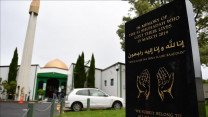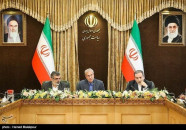'Sense of impunity' surrounds enforced disappearances in Pakistan: UN
No measures have been taken to address issue of reparation of victims of enforced disappearances, report states.

Victims complained that, even when clearly identified by witnesses, perpetrators were not only never convicted, but never subjected to any effective investigation either. PHOTO: FILE
The working group said it was unable to obtain any information on any conviction of state agents in relation to acts of enforced disappearances.
At the invitation of the Pakistan government, the working group on Enforced or Involuntary Disappearances had visited the country from September 10-20, 2012.
During the visit, the working group had held meetings with high-level authorities, including those in charge of the implementation of international human rights standards, civil society groups and families of victims of enforced disappearance.
A number of high-ranking government and security officials including the Chief Justice of Pakistan, chief justices of four high courts, the director general of Inter-services Intelligence and the Inspector General of Frontier Corps in Balochistan and Khyber-Pakhtunkhwa were met as well.
According to the report, the working group transmitted 151 cases of missing persons to the government. Of these cases, nine cases have been clarified on the basis of information provided by the source, 42 cases have been clarified on the basis of information provided by the government, one has been deleted, but 99 remain outstanding.
“In Balochistan alone, some sources alleged that more than 14,000 people are still missing, while the provincial Government recognizes less than a hundred. To date, the Commission of Inquiry on Enforced Disappearances still has more than 500 cases on its docket concerning the whole country.” the report stated.
Inquiries made by the group found that some concerned families were promised that if they did not file a case, their loved ones would be released.
The report states that “Other families were threatened that, if they did file a case, their loved ones would be harmed, or another member of their family would also be abducted.”
In a few cases, the report said, the lawyers defending the families were reportedly themselves victims of enforced disappearance.
According to the families that spoke to the visiting group, some of the abducted persons were released, while others were never seen again. Those who were returned testified to having been held in unofficial secret places of detention and were allegedly threatened not to speak about their period of disappearance.
The same criticism was also made of the Commission of Inquiry, which is said to have limited authority on the various law enforcement or intelligence agencies allegedly involved in the cases of enforced disappearance. The working group received reports that the commission was satisfied with the denial of the accused agency that it had the concerned person in custody.
The commission informed the working group that, should its orders not be complied with, it had the power to initiate criminal proceedings against the potential perpetrators. The working group did not, however, receive any report of such criminal proceedings.
Shedding light on difficulties, according to various sources, “criminals, terrorists and militants from armed groups enjoyed great impunity because, even when investigations were initiated against them, they managed to evade prosecution by using threats against the police, judges and witnesses.”
Victims complained that, even when clearly identified by witnesses, perpetrators were not only never convicted, but never subjected to any effective investigation either.
The working group, despite its reiterated requests, received no information relating to the conviction of state agents in relation to acts of enforced disappearance.
According to the report, no specific measures have been taken until now to address the issue of reparation of victims of enforced disappearances. The group claimed that the issue cannot be dealt with by “classic court proceedings alone”.
It pointed out that there was no law in Pakistan that specifically addressed the matter of enforced disappearances and urged the country to ratify international conventions on the matter.



















COMMENTS
Comments are moderated and generally will be posted if they are on-topic and not abusive.
For more information, please see our Comments FAQ